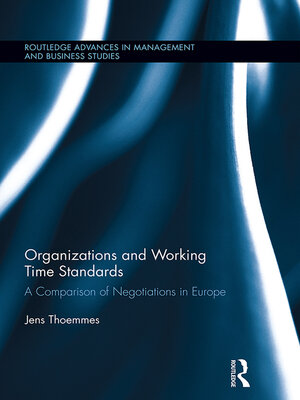Organizations and Working Time Standards
ebook ∣ A Comparison of Negotiations in Europe · Routledge Advances in Management and Business Studies
By Jens Thoemmes

Sign up to save your library
With an OverDrive account, you can save your favorite libraries for at-a-glance information about availability. Find out more about OverDrive accounts.
Find this title in Libby, the library reading app by OverDrive.



Search for a digital library with this title
Title found at these libraries:
| Library Name | Distance |
|---|---|
| Loading... |
Collective bargaining between employers and trade unions has profoundly changed working conditions in companies around the globe. But why do we start work at the age of 10, 16, 18 or 24? Why do we work 6, 8, 10 or more hours a day? These questions are becoming increasingly pertinent as working norms are fractured and fragmented by country. This book brings an entirely new perspective to our understanding of changes in working time. In both the UK and the US, effective legal or collectively-bargained regulation of working time has been limited over the last 20 years, to the extent that its disappearance is seen as almost unproblematic. Here author Jens Thoemmes sheds light on this transition and its economic implications with a fully evidenced sociological account, based particularly on original research into cases of working time standards in France and Germany.
This book addresses the whole process of working time regulation over the last twenty years, evaluating the activities of trade unions, employers, and the State. While theories of industrial relations have already addressed the issue of markets in the context of collective bargaining, this book draws connections between time and markets, places these transitions in their historical contexts, and illustrates the importance of this movement crossing borders and cultures.







